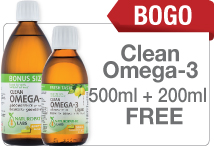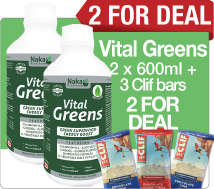- 3.5mg
- Zinc (zinc citrate, zinc bisglycinate)
- 200mg
- Vitamin C (ascorbic acid)
Glycerine, Monk Fruit Extract, Orange Flavour, Stevia Leaf Extract, Potassium Sorbate, Purified Water, Xanthan Gum, Xylitol.
Format
 Liquid
Liquid
300ml
Dosage
Adults only: Take 2 tsp, 2 times per day. Take with food, a few hours before or after taking other medications or natural health products.
Important Information
Keep out of the reach of children. Zinc supplementation can cause a copper deficiency. If you are unsure whether you are taking enough copper, consult a health care practitioner prior to use.
- Helps with immune function
- Helps to maintain healthy bones, hair, nail and skin
- Helps in wound healing
- Delicious orange flavour
- Free from dairy, egg, artificial colours, yeast, wheat, soy, gluten, GMO
Related Videos
Articles by a naturopathic doctor.
Organika, formulators of Canada’s best-selling Collagen and marine collagen and Bone Broth supports skin and joint health. Organika's health products also include; Organika spirulina, Chlorella, Curcumin to support inflammation, Organika Enhanced Collagen Protein, and Adaptogens to provide balance. Shop Organika here at National Nutrition.ca for quality, Canadian-made supplements.
ZINC SUPPLEMENT BENEFITS & FOOD SOURCES
By: Articles by a Naturopathic Doctor and a Holistic Nutritionist
One of the first signs of zinc deficiency can be altered taste and smell...
Earl Mindell put it best in his book, The Vitamin Bible, when he wrote in the chapter Zinc Supplements, “The mineral zinc acts like a traffic policeman, directing and overseeing the efficient flow of bodily processes (and) the maintenance of enzyme systems and cells”. The specific term used is "coenzyme", which means that zinc is a helper in many of the natural chemical processes that occur every day in your body, and without which those same processes cannot occur.
This explains why zinc is beneficial for so many body functions. And considering that soils have become depleted, taking a zinc supplement is essential these days to avoid health concerns associated with zinc deficiency. But what does this important mineral actually do that gives it such a well-deserved reputation for optimizing health
What Zinc Does For The Body
It is especially important in the prostate gland where supplemental zinc has been shown to decrease prostate inflammation; Zinc concentrates in the reproductive glands where it aids in normal fetal development and sperm maturation. Zinc is also a regulator of the immune system ensuring that cells for identifying and killing microbes, viruses and cells are in good working order. Zinc is a cofactor for the antioxidant system superoxide dismutase (SOD). Antioxidants neutralize free radicals. They are unstable molecules that in their bid to become more stable must bump into healthy cells and cause damage. Zinc also speeds wound healing and is used for the healing of burns and surgical incisions. Zinc is involved in the sensory organs, the eyes, nose and taste buds.
One of the first signs of zinc deficiency can be altered taste and smell. Zinc regulates the activity of insulin, for blood sugar control, thyroid hormone, for metabolism and the digestion of sugar and protein. Natural health practitioners use zinc for a variety of health concerns including; acne, benign prostatic hyperplasia, colds, flus, diabetes, diaper rash, stomach ulcers, macular degeneration, impotence, osteoporosis, eczema and wound healing.
Zinc Supplement Benefits
The benefits of taking a zinc supplement each day mean that you don't need to be as concerned about getting enough zinc from your food; it's very easy to simply take a tablet with a meal regularly. However, there are many forms and formats of this important trace mineral available in health food stores.
Formats of Zinc Supplements
Zinc is available in a number of different forms, each of which has it's own unique benefits for certain types of people shopping for zinc supplements:
Tablets - Zinc tablets are an easy way that most people can get their daily dose. They're also the most reasonably priced. However, they can sometimes be dry, making them a challenge to swallow for some people.
Capsules - Zinc capsules are a great alternative for zinc shoppers who don't swallow tablets very well. As they're encapsulated in smooth gelatin, they go down very easily with water or juice, plus they are readily digested making them effective for people with digestive issues.
Lozenges - The zinc in a lozenge format gets absorbed directly through the tongue, mostly bypassing the rest of the digestive system altogether. This makes zinc lozenges the fastest-acting zinc supplement in restoring blood levels in the body. Other immune health supporting supplements, such as Vitamin C, Echinacea, and Elderberry are often included in zinc lozenges.
Liquid - Liquid zinc supplements offer superior absorption without the usual tableting or capsuling agents found in the other formats noted above. This makes liquids ideal for people shopping for as clean a supplement as possible.
Topical - Zinc Oxide is the most popular topical form, which is most often used as a natural sunblock, but it's also used as healing zinc ointment for reducing skin irritation.
Forms of Zinc
The supplemental forms of zinc are the inorganic zinc sulphate and the organic zinc gluconate and zinc picolinate. The chelated, organic forms of zinc, picolinate and gluconate, are easier for the body to use. Zinc is usually found in tablet form or as lozenges, for use during colds. Zinc is also a part of multivitamin/mineral formulas and some immune boosting and antioxidant formulas. A special form of zinc called zinc monomethionine is used as an antioxidant. It has antioxidant activity equivalent to that of vitamin C, vitamin E and beta-carotene. As they can compete for absorption, it is often recommended to take a copper supplement concurrently with zinc, usually in a ratio of 10-15mg of zinc to 1mg copper. Some zinc supplements will actually include copper with them in the same tablet or capsule in order to prevent a copper deficiency during long term use.
Foods High in Zn
Soil depletion is such a common phenomenon today that many people are deficient not just in zinc, but many other essential minerals. However, considering that organic farming is becoming more widely used, soils are once again becoming enriched with trace nutrients, albeit slowly. Foods that are high in zinc:
- Seeds, especially pumpkin seeds
- Nuts, especially Brazil nuts
- Seafood, especially shellfish
- Mushroom, in particular shitake mushrooms
- Whole Grains, such as quinoa and brown rice
Zinc levels are decreased by diarrhea, kidney disease, liver disease, alcoholism and diabetes. Zinc is not absorbed well when it is consumed with fibre, phytates (found in grains and legumes), hard water, calcium, and iron, so it's best to use it at least two hours away from any of those mentioned. Zinc is lost through perspiration so supplementation may be helpful for athletes, those who live in hot climates and those who regularly use saunas or steam rooms. Zinc is depleted by the following medications: oral contraceptives, some diuretics, ulcer medications, antiviral medication and some antibiotics. Much of our food is deficient in zinc due to poor soil levels of the mineral. Food processing techniques destroy zinc.
Zinc – Quick Facts
Food Sources
· Brewer’s Yeast, Seaweeds, Egg Yolks, Fish, Meats, Legumes, Liver, Mushrooms, Pecans, Poultry, Pumpkin, Seafood, Soybeans, Sunflower Seeds, Whole Grains.
Deficiency Symptoms
· Loss Of Taste And Smell, Thin Nails, White Spots On Nails, Acne, Fatigue, Hair Loss, Impotence, Frequent Colds And Flus, Memory Impairment, Prostate Disorders, Slow Wound Healing, Stretch Marks.
Optimum Dosage
· 15-60mg Of Elemental Zinc Daily. (Clinical Doses May Be Higher As Recommended By Your Practitioner.
Works Well With
· Vitamin B Complex, Vitamin C, Magnesium, Vitamin A, vitamin E, Calcium, Phosphorus
Important Information
· Zinc Is Not Toxic Until Consumption Reaches 2g Daily. Toxicity Symptoms Include Nausea, Vomiting, Diarrhea, Dizziness And Anemia.
- Reviews
- POST A NEW REVIEW





















